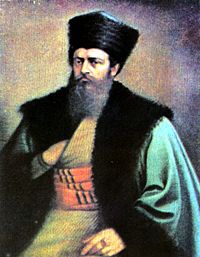
Constantine Mourousis
Encyclopedia

Greek language
Greek is an independent branch of the Indo-European family of languages. Native to the southern Balkans, it has the longest documented history of any Indo-European language, spanning 34 centuries of written records. Its writing system has been the Greek alphabet for the majority of its history;...
: Κωνσταντινος Δημητριος Μουρουζης – Constantinos Demetrios Mourouzis, Romanian
Romanian language
Romanian Romanian Romanian (or Daco-Romanian; obsolete spellings Rumanian, Roumanian; self-designation: română, limba română ("the Romanian language") or românește (lit. "in Romanian") is a Romance language spoken by around 24 to 28 million people, primarily in Romania and Moldova...
: Constantin Dimitrie Moruzi; died 1783) was a Phanariote
Phanariotes
Phanariots, Phanariotes, or Phanariote Greeks were members of those prominent Greek families residing in Phanar , the chief Greek quarter of Constantinople, where the Ecumenical Patriarchate is situated.For all their cosmopolitanism and often Western education, the Phanariots were...
Prince of Moldavia
Moldavia
Moldavia is a geographic and historical region and former principality in Eastern Europe, corresponding to the territory between the Eastern Carpathians and the Dniester river...
, and member of the Mourousis family
Mourousis family
The Mourousis or Moruzi are a family which was first mentioned in the Empire of Trebizond. Its origins have been lost, but the two prevalent theories are that they were either a local family originating in a village which has a related name or else one that arrived with the Venetians during the...
. A remarkable polyglot, he spoke five languages: Greek
Greek language
Greek is an independent branch of the Indo-European family of languages. Native to the southern Balkans, it has the longest documented history of any Indo-European language, spanning 34 centuries of written records. Its writing system has been the Greek alphabet for the majority of its history;...
, Latin
Latin
Latin is an Italic language originally spoken in Latium and Ancient Rome. It, along with most European languages, is a descendant of the ancient Proto-Indo-European language. Although it is considered a dead language, a number of scholars and members of the Christian clergy speak it fluently, and...
, French, Arabic
Arabic language
Arabic is a name applied to the descendants of the Classical Arabic language of the 6th century AD, used most prominently in the Quran, the Islamic Holy Book...
and Turkish
Ottoman Turkish language
The Ottoman Turkish language or Ottoman language is the variety of the Turkish language that was used for administrative and literary purposes in the Ottoman Empire. It borrows extensively from Arabic and Persian, and was written in a variant of the Perso-Arabic script...
.
In 1761, he became Grand Postelnic
Postelnic
Postelnic was a historical rank traditionally held by boyars in Moldavia and Wallachia, roughly corresponding to the position of chamberlain...
(foreign minister) in Moldavia, and soon after Second Dragoman
Dragoman
A dragoman was an interpreter, translator and official guide between Turkish, Arabic, and Persian-speaking countries and polities of the Middle East and European embassies, consulates, vice-consulates and trading posts...
(deputy minister) of the Ottoman Empire
Ottoman Empire
The Ottoman EmpireIt was usually referred to as the "Ottoman Empire", the "Turkish Empire", the "Ottoman Caliphate" or more commonly "Turkey" by its contemporaries...
Admiralty, and eventually Grand Dragoman. There are indications that he was politically involved in the dismissal and assassination of his predecessor, Prince Grigore Ghika III
Grigore III Ghica
Grigore III Ghica was twice the Prince of Moldavia between 29 March 1764 – 3 February 1767 and September 1774 – 10 October 1777 and of Wallachia: 28 October 1768 – November 1769....
, by the Porte. Trusted by the Porte, he obtained the throne of Moldavia on October 12, 1770.
Mourousis spent much of his time in Iaşi
Iasi
Iași is the second most populous city and a municipality in Romania. Located in the historical Moldavia region, Iași has traditionally been one of the leading centres of Romanian social, cultural, academic and artistic life...
, supervising the gathering of agricultural resources demanded by the Porte, but also fought extravagant luxury and surrounded himself with scholars, paying particular attention to schools and founding scholarships. He was deposed on June 7, 1782 and exiled to the island of Tenedos
Tenedos
Tenedos or Bozcaada or Bozdja-Ada is a small island in the Aegean Sea, part of the Bozcaada district of Çanakkale province in Turkey. , Tenedos has a population of about 2,354. The main industries are tourism, wine production and fishing...
. He returned in 1783, but died soon after.

